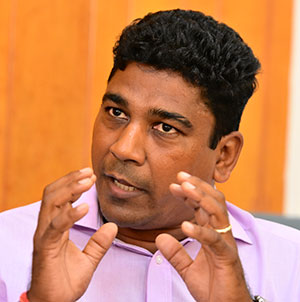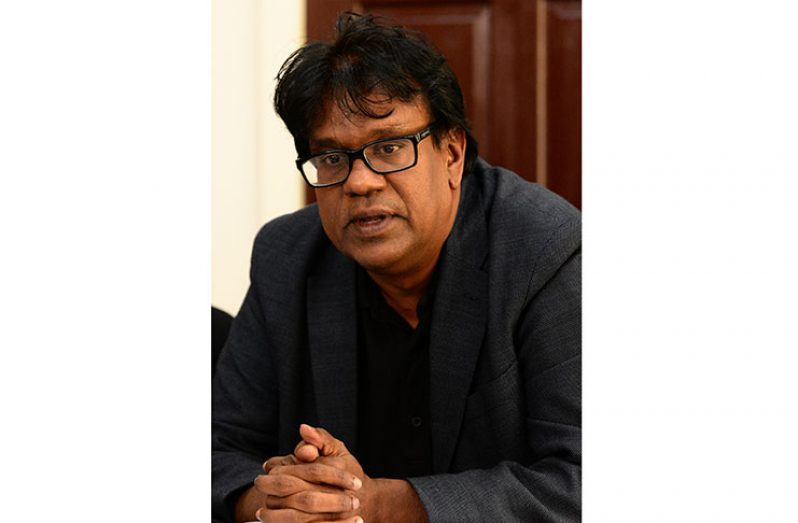–Florida company with Middle East links bids for all 3
A US registered company in Florida with links to the Middle East has submitted bids for the Enmore, Skeldon and Rose Hall Estates which have been earmarked for privatisation.
According to PricewaterhouseCoopers (Jamaica) Managing Director, Wilfred Baghaloo, the Florida company was among a total of 10 bids submitted to the National Industrial and Commercial Investments Limited (NICIL) for the privatisation of the state-owned estates.

At a news conference at NICIL’s Camp Street, Georgetown office, Baghaloo said that the bidding process, which was opened in July of this year, was closed on Wednesday at 16:00hrs following an extensive period of advertisements locally, regionally, and internationally.
“Upon opening the boxes containing the bids, we can confirm that we received several bids for the various estates,” Baghaloo said, adding that the process was observed by PwC, representatives from the Auditor-General’s Office and members of the Special Purpose Unit (SPU)’s Steering Committee.
Baghaloo, while declining to disclose how many companies have actually bidded to privatise the three estates and their names, would only tell reporters that a single international company participated in the process, and its country of origin. The other companies, he said, are from Guyana and within the region.
PwC, the international financial services provider selected to conduct the valuation of all assets under the control of Guyana Sugar Corporation (GuySuCo) in addition to providing other advisory and financial services, has committed to making public the names of the companies today.
Baghaloo said PwC will shortly commence the process of analyzing the huge quantum of data contained in many of the bids. “Our first set is to ensure the bids comply with the instructions provided in the Information Memorandum,” the Jamaican national posited.
The Information Memorandum was sold to bidders at a cost of US$1000, and gives potential bidders automatic access to three virtual data rooms that contained information and data about all three estates. A total of 12 Information Memorandums were sold, but only 10 bids were submitted.
Baghaloo said that at a meeting in September with potential bidders, he had explained that a technical proposal carries 70 per cent of the score, while the remaining 30 per cent focusses on the price or valuation and the economics to the country.
The criteria for the technical proposal includes information on the financial capacity of the bidder, their experience in the sugar industry, quality of corporate governance, quality of management, extension programmes for cane farmers, timing of attaining full capacity, quality of development plan and the development plan and linkages with and support of other industries within the country.
BEST POSSIBLE DEALS
Noting that it is important for the government to secure the best possible deals, Baghaloo said:
“The primary objective of the government is to get a qualified, experienced, competent and well-structured proposal to operate the factories for the foreseeable future and that is why the technical component is more weighted in the scoring process.”
Before bidding for the threes estates, the bidders were informed that the estates must remain in the “cane industry”, though not necessarily the sugar industry.
“As you know,” Baghaloo said, “cane is a grass; it is a big grass, and so you can use the cane for many things: Cosmetics, molasses, liquid sugar, bagasse, energy, co-generation plants…
“But we want it to remain in the cane industry, because we want the lands to remain in some form of agriculture.”
Weighing in on the matter, SPU Privatisation Specialist, Shawn Persaud explained that it is the government’s intention to have the ex-sugar workers incorporated into the privatisation arrangement, hence the requirement to remain within the cane industry was put in place.
At the time of that September meeting, 14 potential bidders from Trinidad, Canada and Guyana had met with the privatisation team led by Baghaloo at the Guyana Marriott.
It was during that meeting, which brought into play critical elements of the Information Memorandum, that the potential bidders raised a number of concerns, including regulations needed to ensure fair competition with the government, the functionality of the factories, and access to markets currently served by GuySuCo.
As the PwC man explained: “The industry has been primarily government-owned and what we are doing is privatising a part of the industry.
“So there are six factories; three remain with the government and three we are trying to hand to the private sector.
“So the private sector’s natural concern is: How am I going to compete with government? How we will compete with government in terms of access to market? How will we compete with government in terms of access to cane variety?”
He noted, too, that the bidders were also concerned with the functionality of the factories, as in whether they were being asked to buy scrap metal as opposed to a potential growing concern.
Baghaloo pointed out, too, that when the bidding process was opened, none of the factories were in operation, but that Enmore and Skeldon were subsequently re-opened to showcase their functionality.
PLEASING RESPONSE
Notwithstanding the concerns raised and the request to extend the bidding process, Baghaloo said that PwC is pleased with the response. He noted that within seven days, the first review of the bid documents will be completed.
“The second step is to analyze the bids in accordance to the Evaluation Criteria as outlined in the Memorandum of Understanding. Part of analyzing the process may require clarification meetings and questions,” he explained.
Once that is completed, he said PricewaterhouseCoopers, no later than 30 days, will make recommendations to the Steering Committee and NICIL, which latter company will in turn then make the necessary recommendations to Cabinet.
“It should be noted, as stated in the Information Memorandum, that the government does not have to accept any offer or bids. Which means the government may choose to reopen the process should it be deemed necessary,” Baghaloo stated.




.png)









